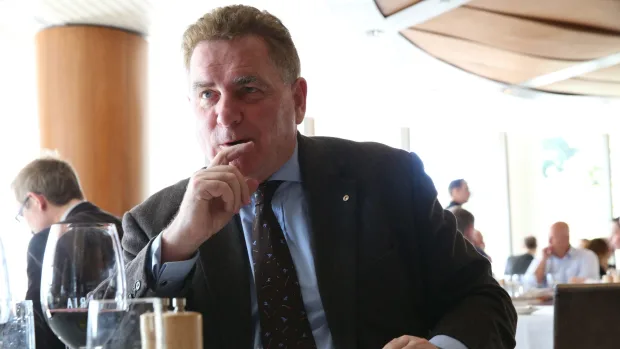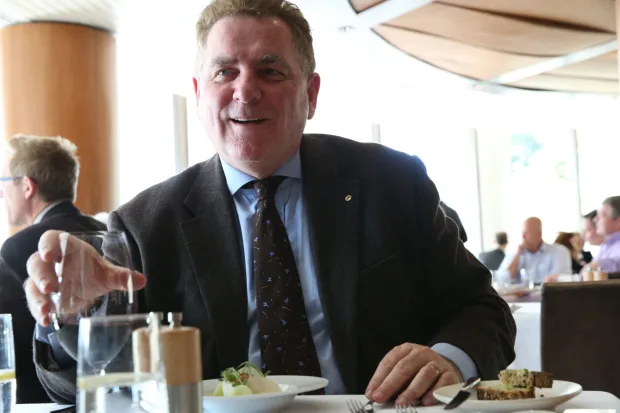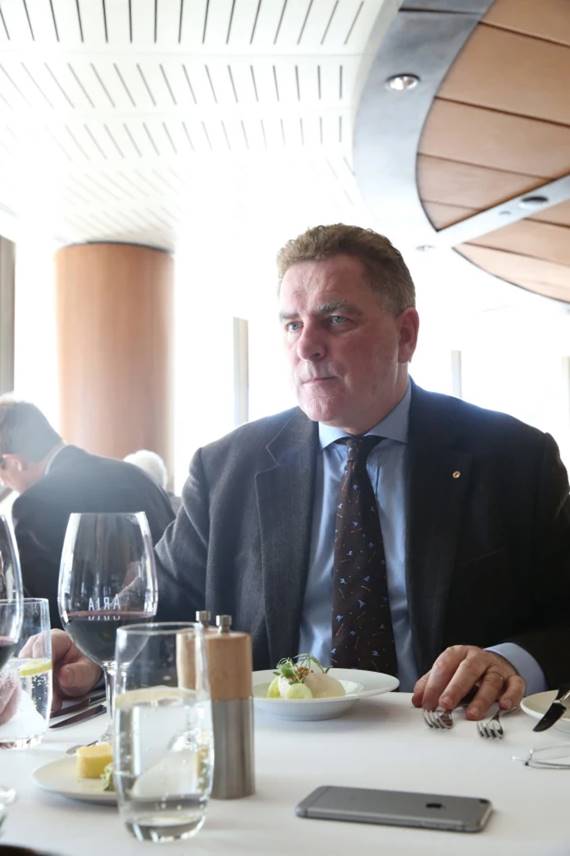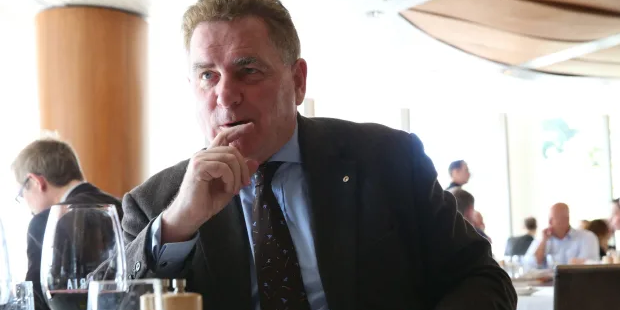Article based on an interview over lunch by Matthew Cranston, former Property Editor, now Canberra-based Economics Correspondent, The Australian Financial Review, 16 September 2016, https://www.afr.com/work-and-careers/management/afr-lunch-michael-easson-on-the-poetic-and-spiritual-side-of-politics-20160908-grbb61

I might have to raise my voice and abandon the Australian drawl for this lunch. Even in the quiet corner of Matt Moran’s Aria restaurant overlooking Circular Quay, Dr Michael Easson, chairman of the Association of Superannuation Funds and co-founder of real estate funds manager EG, has some difficulty hearing me.
His hearing impediment, from birth, has played in his favour before and could help with nosy journalists. When presiding over the left and right political factions as the secretary of the NSW Labor Council through the great Hawke-Keating era, Easson gained a reputation for always being unperturbed, conciliatory and calm.
“But really it was just because I couldn’t hear what any of them were saying,” Easson says with a grin.
His humour is dry but refreshing. I later find out it has been heavily influenced by one of his favourite authors – Clive James – whom he began to read late in life after buying a copy of Falling Towards England for $1 at a throw-out sale.
Easson has taken a seat so his back is to the restaurant. It’s a sensible move, possibly designed to forestall interruptions from members of the Sydney business community who frequent the place. After his Labor Council background, as well as a short stint as vice-president of the ACTU and seats on boards ranging from NSW State Superannuation to more than 10 ASX-listed companies such as ING Property Group, Easson has built a prolific network.
Over the years, he has collected a varied group of friends from his wife and former federal politician, Mary, to journalists such as Greg Sheridan and unionists like Joe de Bruyn.
Those Left Behind
I can’t help thinking his seniority and presence might have come in handy attracting the waiter’s attention. While we wait for him to return, I tell Easson my fears of technology’s rapid replacement of jobs.
He responds in his steady, signature baritone with a line he formulated in 1988 in a speech to the union.
“The factory of the future will be run by a man and his dog – the dog to guard the factory and the man to feed the dog.
“What does worry me,” he continues, “is whether the disappearance of a lot of traditional jobs means there might be some significant structural unemployment challenges.”

He mentions Brexit and the rise of Trump in the United States.
“Life for many such people in the US seems like a dystopian nightmare. Public policy has to mitigate and prevent that outcome here.
“I think it will go back to the social democratic small ‘l’ liberal tradition, which is what you need to ensure the dynamism of the market economy works – you need a helping hand for those people who need to be lifted up and retrained.”
The waiter returns. Easson chooses an entree of spanner crab tart and a main of pink snapper – it is Friday and it’s possibly an old-school Catholic choice. I have already gone for the veal brisket.
The Two That Got Away
Politics is on the menu too. Easson claims he tried to recruit Malcolm Turnbull to the Labor Party, along with predecessor Tony Abbott, back in the late 1980s when he was at the Labor Council – he served first as the education officer before moving up the ladder to secretary.
“I met [Abbott] with late DLP senator Jack Kane. Abbott’s worry about joining the Labor party was the left and not having a place, but I argued the communists were in the Labor Party not the Liberal Party, so if you want to fight the communists join the Labor Party.”
(Abbott later confirms this and says he wrote a piece as a journalist predicting how influential and successful Easson would become.)
One of the best-connected people in Australia – David Gonski – also gives his stamp of approval to Easson’s success.
“Michael is an extremely diligent and very experienced person who has straddled beautifully many sectors from business and property to quasi politics and academia,” Gonski says straight off the cuff.
Easson – a Catholic boy from south Sydney’s Penshurst – had surprised his bank manager father by taking a liberal arts degree with first-class honours at the University of NSW, following years of physics and maths at high school.
Reading and studying clearly appeal. In the past six years, Easson tells me, as he rummages through his ration of first-course crab, he has finished a master’s degree from Oxford, a PhD in history from the Australian Defence Force Academy and a second PhD in transport and urban planning from the University of Melbourne.
In the Zone
As for Gonski, it turns out he was one of the earliest motivators for Easson’s current property business, EG Funds Management, which has about $2.4 billion in assets under management.
Easson recalls that in 2000, when he was on the board of the Macquarie Goodman Industrial Trust, Gonski had called, asking if Easson could help out a friend who ran Kennedy Health Care.
The friend’s father had been knocked back on a rezoning application in Campbelltown, Sydney, and needed advice.
Easson called upon a friend, Adam Geha, who he had met through Macquarie Group. Adam connected Easson to his brother, Shane Geha, who was in property and could help Easson on the rezoning issues.
A week later, Easson received another phone call, this time from an old university acquaintance, Richard Scheinberg, whose family co-founded property group Stockland. Scheinberg also needed help on a rezoning matter.
Easson and Geha formed a partnership advising such people, identifying opportunities to rezone properties. In 2002, Adam joined his brother and Easson to create the funds management business.
EG has been buying properties next to infrastructure for more than a decade and capturing the upside from rezoning. In August EG raised $400 million from investors. Easson does not reveal who the investors are but he has clear views on Chinese investment in property.
“Australia needs investment from China. Promoting ourselves as safe, stable, welcoming destination is critical to our future.” He has criticised at length in The Australian Financial Review what he calls populist taxes by governments on foreigners, but he doesn’t mince words when it comes to Senator Dastyari and his fall from grace as a result of his Chinese connections.
“On Senator Dastyari, I have none other than to hope he has learnt a hard lesson on the ethics, the implications, and sense of what he did.”
Turned off the Rails
Infrastructure and planning have clearly been a big part of his life. After serving as a director on the State Rail Authority in the early 1990s, Easson aimed to deliver Sydney’s Western Fastrail project for Leighton Contractors in 2002. The project never eventuated and apart from an appendix in his transport PhD thesis – which he says people never read but which he needed to get out of his system – Easson has never again attempted to lobby for rail projects.
“It’s too hard – it’s for other people with deeper pockets and greater patience. I’ll write another PhD on why road projects get up and not rail,” he says smiling.
For him, the road lobby was and is smarter and it pieces together private and public partnerships better.
“Rail projects have been poorly executed. The Epping to Chatswood project [in north-west Sydney] which was supposed to cost $750 million ended up costing $2.3 billion, so I think people in government thought if you touch rail it’s a disaster.”
As we begin to work our way through the minimalist, artistic cuisine – both the snapper and veal are glistening in their glaze or verjuice – we look out onto the Sydney foreshore. There is a quick reference to Barangaroo and how James Packer lobbied to get his casino and tower project approved.
The result Easson describes as: “Almost incredibly incredible if one might say so.”
Easson has discretion when it comes to big business.
Tony Berg – the first managing director of Macquarie Bank – asked Easson to join the Macquarie Goodman Industrial Trust in 2000 and said: “I want you to keep an eye on two people as an independent director.”
The first was billionaire Lang Walker, who had a joint venture with Macquarie, and the second was Bill Moss, who was the head of property at Macquarie.
“’I want you to play devil’s advocate,’ Tony said to me and so I did. But Bill Moss, I learnt a lot from him,” he says with a smile. “Indefatigable determination,” was the key lesson but also to “try and be interesting – other people will want to talk to you.”
Eccentric Affinities
Easson explains that he has a great desire to learn, even from eccentrics.
His master’s thesis was about an eccentric architect from the early 20th century called Arthur Penty.
Easson had come across a book referring to some essays Penty had written in 1914 on what the world would be like post-industrialism. Penty had been the first to use the phrase “post-industrialism” – a concept which has huge relevance today in the world of booming technology.
However, Easson could find no trace of the Penty essays, not even in Oxford’s Bodleian Libraries or WorldCat – the world’s largest bibliographic database.
He soon worked out that the book had never been published because of the First World War. That sent him on a global search and he finally found the “missing book” in manuscript form in a dusty cupboard in Texas, United States.
Easson’s analysis of Penty’s ideas on post-industrialism forms a full chapter in his thesis. He says Penty believed that “society [had] plunged light‐heartedly into the perils of industrialisation, with little thought as to the future”.
Penty wanted a post‐industrial world to “reverse some of its deleterious consequences upon modern life” and suggested that might include a return to the decentralised, small workshop artisan society, ennobling work.
Easson says Penty was disappointed with the Fabians because of their rationality and rejection of the past, in their haste to move forward. “Yet on Penty’s reckoning, the past stays with us whether we recognise it or not.”
Why so Shy on Religion?
Easson’s mandarins with macadamia nut, white mulberries and yoghurt arrive. The bottle of Clare Valley shiraz has steadily emptied; our conversation turns to literature.
George Orwell is an Easson favourite but more for the essays like A Nice Cup of Tea which sets out rules on how to make tea and describes how even the best manner of making it has been the subject of “violent disputes”.
“Orwell gave [G.K.] Chesterton credit for thinking about how to write cleverly. Even though Orwell was an anti-Catholic, he was one of the greatest writers and he was influenced by people he disagreed with.”
Easson laments that most people in political life seem to have no vigour in their language anymore – they seem bound by a “carefully scripted dullness”.
“What’s terrible about them is that there is no spirituality associated with what they say,” Easson, a “regular” Sunday Mass attendee, says.
In Australia, he thinks there are some good young politicians coming through. Among the conservatives, he picks Josh Frydenberg and Angus Taylor while on the Labor side he likes Jim Chalmers, Richard Marles and Chris Bowen.
Easson’s sense is that a politician’s spiritual side can be one of the most valuable things they possess.
“Actually a person’s faith is an interesting feature of what makes up their person,” says Easson. “Some of them are so different from their public personas. In public life there is almost a fear of projecting, and I think we are slightly embarrassed of revealing our true colours on religion.”
But one of Australia’s greatest poets, Les Murray, whose Archibald portrait Easson donated to the liberal arts college Campion College, in Sydney, wrote a poem The Last Hellos which dealt a little with the self-awareness of one’s religion. It doesn’t beat around the bush.
“Snobs mind us off religion
nowadays, if they can.
F— them. I wish you God.”








